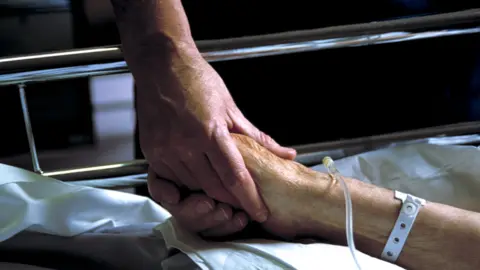Patients' concerns over chronic pain treatment removal
 SPL
SPLAn East Yorkshire MP has claimed people have told her they "see no point in continuing to live" if the NHS ends treatment for their chronic pain.
More than 80 patients have been told that their Pain Infusion Therapy (PIT) will be reduced before ending completely in a year's time.
PIT involves the delivery of drugs via a drip feed.
Local NHS bosses said the ending of PIT was part of a review of patients' treatment.
Labour MP for Hull West and Hessle, Emma Hardy, claimed the ending of PIT was due to NHS budget cuts and called on Prime Minister Theresa May to "personally intervene" and provide extra funding.
She said 10 people had contacted her and "many have told me they would see no point in continuing to live" if the therapy was withdrawn.
"The cuts to the NHS shouldn't be counted in terms of budgets but in lives destroyed," she said.
Responding to the MP during Prime Minister's Questions, Mrs May claimed the government "was putting extra money" into the NHS.
"CCGs will be taking individual decisions about how they apportion their funding," she said.
"But to stand up here and suggest we are cutting funding to the National Health Service is plain wrong."
'Best treatment'
Heath Marsh-McLeod has been undergoing monthly treatment for more than 15 years after being diagnosed with fibromyalgia, a long-term condition that causes pain all over the body.
He said he was "devastated" by the decision and had tried alternative therapies in the past "but nothing works in the same way that this works".
"It helps me function day-to-day," he said.
"Without this infusion therapy all that will stop. Who are these people to decide that I haven't got a right to be pain free?"
Dr Dan Roper, chair of the Hull Clinical Commissioning Group, denied that PIT was being removed to save money but was part of a review to ensure patients got the "best treatment".
"Individual patients will say they get a lot of benefit from it, " he said.
"The difficulty is that if you look at really well controlled randomised trials of this form of treatment there isn't an overwhelming evidence that it's effective in the population."
